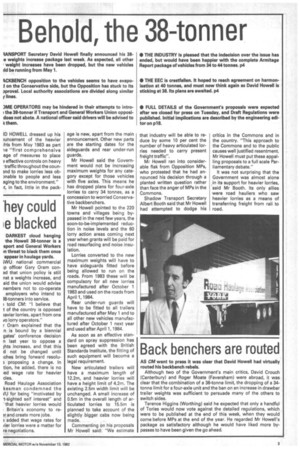Behold, the 38-tonner
Page 3

If you've noticed an error in this article please click here to report it so we can fix it.
1ANSPORT Secretary David Howell finally announced his 38 e weights increase package last week. As expected, all other r weight increases have been dropped, but the new vehicles iId be running from May 1.
kCKBENCH opposition to the vehicles seems to have evapo i on the Conservative side, but the Opposition has stuck to its *royal. Local authority associations are divided along similar f lines.
)ME OPERATORS may be hindered in their attempts to introthe 38-tonner if Transport and General Workers Union opposidoes not abate. A national officer said drivers will be advised to ic them. • THE INDUSTRY is pleased that the indecision over the issue has ended, but would have been happier with the complete Armitage Report package of vehicles from 34 to 44 tonnes. p4
• THE EEC is crestfallen. It hoped to reach agreement on harmonisation at 40 tonnes, and must now think again as David Howell is sticking at 38. Its plans are awaited. p4
• FULL DETAILS of the Government's proposals were expected after we closed for press on Tuesday, and Draft Regulations were published. Initial implications are described by the engineering editor on p18.
ID HOWELL dressed up his suncement of the heavier Ihts from May 1983 as part le "first comprehensive age of measures to place a effective controls on heavy traffic throughout the counand to make lorries less ob)nable to people and less aging to the environment." 1, in fact, little in the pack age is new, apart from the main announcement. Other new parts are the starting dates for the sideguards and rear under-run guards.
Mr Howell said the Government would not be increasing maximum weights for any category except for those vehicles with five axles. This means he has dropped plans for four-axle lorries to carry 34 tonnes, as a concession to worried Conservative backbenchers.
Mr Howell pointed to the 220 towns and villages being bypassed in the next few years, the soon-to-be-implemented reduction in noise levels and the 60 lorry action areas coming next year when grants will be paid for road resurfacing and noise insulation.
Lorries converted to the new maximum weights will have to have sideguards fitted before being allowed to run on the roads. From 1983 these will be compulsory for all new lorries manufactured after October 1 1983 and used on the roads from April 1, 1984.
Rear under-run guards will have to be fitted to all trailers manufactured after May 1 and to all other new vehicles manufactured after October 1 next year and used after April 1, 1984.
As soon as an effective standard on spray suppression has been agreed with the British Standards Institute, the fitting of such equipment will become a legal requirement.
New articulated trailers will have a maximum length of 12.2m, and heavier lorries will have a height limit of 4.2m. The existing 2.5m width limit will be unchanged. A small increase of 0.5m in the overall length of articulated lorries to 15.5m is planned to take account of the slightly bigger cabs now being made.
Commenting on his proposals Mr Howell said: "We estimate that industry will be able to reduce by some 10 per cent the number of heavy articulated lorries needed to carry present freight traffic".
Mr Howell ran into considerable flak from Opposition MI's, who protested that he had announced his decision through a planted written question rather than face the anger of MPs in the Commons.
Shadow Transport Secretary Albert Booth said that Mr Howell had attempted to dodge his critics in the Commons and in the country. "This approach to the Commons and to the public causes well justified resentment. Mr Howell must put these appalling proposals to a full scale Parliamentary debate."
It was not surprising that the Government was almost alone in its support for heavier lorries, said Mr Booth. Its only allies were road hauliers who saw heavier lorries as a means of transferring freight from rail to road.












































